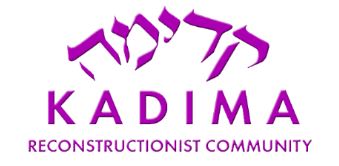At the very end of Bereishit, during which the world itself is created, we see a creator admit their insecurity and doubt about their most recent creation. This piece took so much out of them – they literally put themselves into their work. And it was literally all they worked on for an entire week. During their work, they would take a moment nearly every day to observe the progress and how well along it was coming. “Ki tov!” they would exclaim. Oh, how good!
Perhaps you have had weeks like this in your life – where you spend the bulk of it working on a single thing, and it takes pretty much every waking moment. And it is looking good to you as you go!
And then, like the creator in the book of Genesis, you celebrate the mostly finished product, you take a day off to rest and reflect and enjoy, especially now that your piece truly exists in time and space - not ‘finished,’ as it is like an interactive installation that evolves with each and every interaction. That exuberant feeling of completion-for-now is what Jewish tradition invites us to live into every shabbat.
But then maybe you wake up the next day, and maybe you realize that your creation has taken on a life of its own. It is perhaps misunderstood. Or maybe it gets used for purposes unintended, some of them surprisingly harmful. G-d forbid, ways that go against everything you stand for.
It is natural to feel anger or even rage when things go so astray when there had been such promise. Maybe some resentment and questioning seeps in and pretty soon, you wonder if you ever should have created it in the first place. Oy. That place. It makes me sad to think about the grief of that place. It is guttural.
So when it is said that “Adonai regretted having made humankind on earth. With a sorrowful heart, Adonai said, ‘I will blot out from the earth humankind whom I created—humans together with beasts, creeping things, and birds of the sky; for I regret that I made them,” I am confused, I am angry, but I also understand.
On this topic, the rabbis of the Talmud (shocker) have a lively conversation from multiple viewpoints (in Hebrew: makhloket). On what for other reasons happens to be my favorite page of Talmud (Eruvin 13b), they discuss whether or not humans should ever have been created, given our sometimes (perhaps understatedly) negative impact in the world. While there is something I love about this discussion (makhloket is a love language), there is something so deeply sad about it as well. Despite our beautiful self-awareness about this part of our own nature, we seem to have a very hard time escaping it.
And the rabbis’ conclusion may surprise you: after two and a half years of discussing this issue, they indeed conclude that it would have been better if humans had not been created. But, that is not where they end the conversation. Since we were created, they say, we should examine our actions and, some say, be precise. Intentional. I understand this as an ask to rise to our absolute best-we-can as much as we can.
Life is sacred. Life is precious. How can we continue showing up the best we can for what we truly believe in? For our loved ones? For the endangered? For the children?
As we continue living inside this amazing art installation that is the universe, may we find hope, may we find health, may we find amazement. May we not destroy it even when we are fed up with it – nor each other. And may we use our one precious life (thank you Mary Oliver) to do the absolute best we can, to do best, and then repair when best isn’t good enough, and then to do the best we can again. Repeat, repeat, rest, repeat. Maybe that’s it.
And with that, I say Shabbat shalom - both as a prayer, and as a reminder that rest is part of the cycle.
L’chayim - to life, and to Hayim z”l,
R’ David

 RSS Feed
RSS Feed